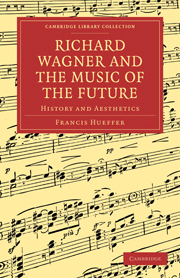Book contents
CHAPTER I
Published online by Cambridge University Press: 29 August 2010
Summary
If I were asked for a striking point of distinction between musicians of the old and modern schools, I should mention, first of all, their essentially altered position with regard to literature in general. During the last century, a musician was expected to study, from his very childhood, all the intricacies, both theoretical and practical, of his art, but beyond this his education, as a rule, showed the most deplorable deficiencies; and whenever he had to write on ordinary foolscap, instead of the accustomed staff of five lines, his hand seemed to shake and his thought to stammer. Mozart, for instance, seems to have been decidedly not above the average level of middle-class education at his time; and to connect the idea of a thinker with good old “papa Haydn,” who, while composing his Creation, used to mumble a couple of “Ave Maria's” when the source of his inspiration ceased to flow, seems grotesquely incongruous. Indeed, with the sole exception of Gluck, no first-rate musician of the eighteenth century can be named who would not have shrunk from the idea of giving literary evidence as to the fundamental principles of his own art; a phenomenon which, in most cases, finds its explanation in the mentioned circumstance of an exclusively technical education. Beethoven's youth also was passed in a purely professional atmosphere; but his powerful mind soon expanded with interests of a wider range.
- Type
- Chapter
- Information
- Richard Wagner and the Music of the FutureHistory and Aesthetics, pp. 1 - 122Publisher: Cambridge University PressPrint publication year: 2009First published in: 1874



